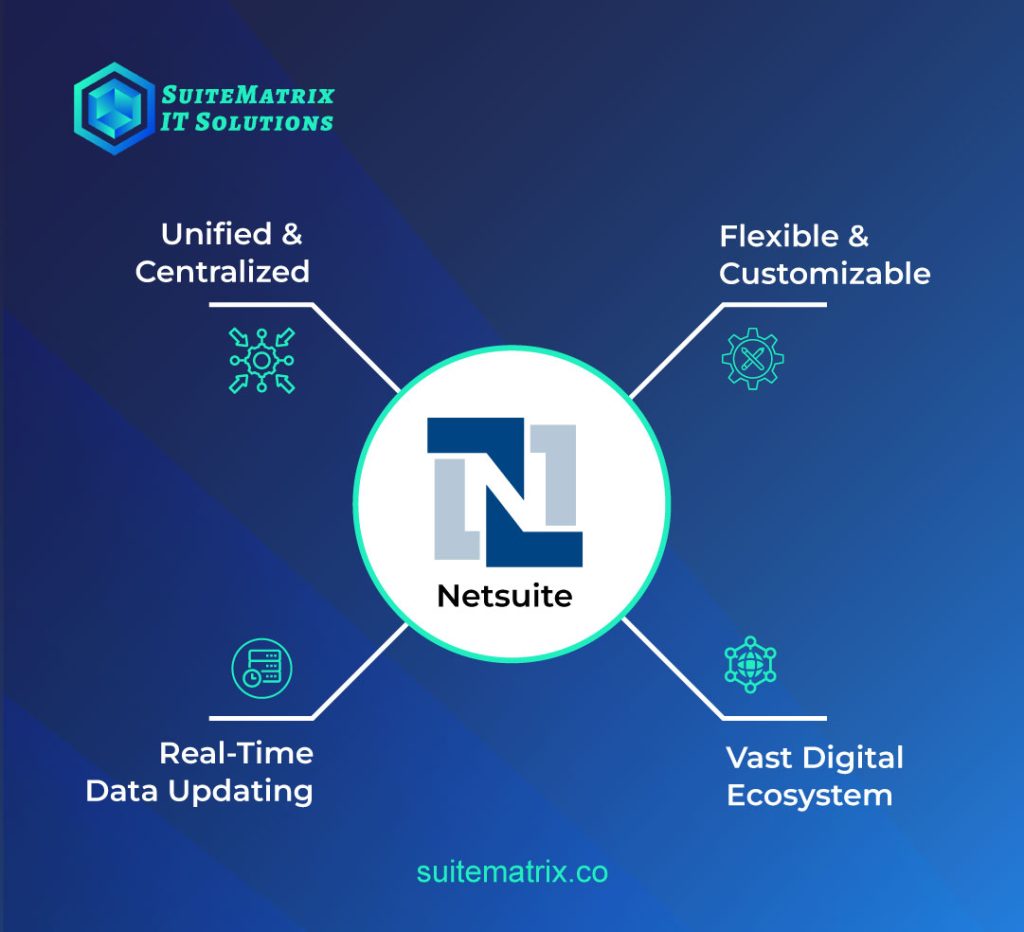
NetSuite offers a comprehensive cloud-based enterprise resource planning (ERP) system that equips companies with essential applications to enhance operational efficiency and foster expansion. Businesses spanning various sizes and industries utilize ERP NetSuite for finance, supply chain management, customer relationship management (CRM), human resources, professional services, ecommerce, and beyond.
Understanding NetSuite
NetSuite offers a cloud-based business management platform which comprises a suite of applications. These applications are designed to help companies manage their operations, gain insights into their performance, and achieve significant efficiency gains and cost savings.

ERP NetSuite system oversees essential functions, including finance and accounting, inventory, orders, and procurement. Customers can enhance their ERP with additional modules such as NetSuite CRM for sales, service, and marketing automation; HR for personnel records, performance management, and payroll; professional services automation (PSA) for project planning and tracking; and omnichannel commerce for both online and in-store sales. All modules share a common database, ensuring real-time data updates are accessible to authorized users across various business functions.
NetSuite operates on a software-as-a-service (SaaS) model, where customers pay a subscription fee to use the technology without the burden of managing the underlying infrastructure or system maintenance. Oracle NetSuite handles all aspects of infrastructure, including server setup, software installation, and the deployment of patches and upgrades, delivering two new software updates annually.
By eliminating the maintenance and upgrade costs associated with on-premises solutions, NetSuite not only reduces expenses but also frees up employees to focus on the company’s core mission and customer service.
The SaaS model also offers scalability, enabling businesses to add functionality as needed without concerns about infrastructure or staffing. For instance, a B2B manufacturer can integrate NetSuite’s ecommerce module when expanding into online sales.
Features of NetSuite
Unified Business View: NetSuite empowers firms to manage their entire business from a single platform, integrating finance, supply chain, manufacturing, HR, and ecommerce into one system with a unified database. This allows employees to log in and easily monitor the status and performance of any operational aspect with just a few clicks.
Native Integrations: NetSuite’s applications feed information into and pull from a central database, ensuring a single source of truth. The platform’s natively integrated modules eliminate the need for unreliable third-party integrations and support real-time updates. This unified architecture provides a consistent user interface across all modules, reducing training time and increasing productivity. It also enables users to complete multi-step processes like order-to-cash and procure-to-pay within a single application without re-entering or exporting data.
True Cloud Solution: NetSuite was designed for the cloud from the ground up. Unlike many “cloud” ERP systems that are merely hosted or hybrid solutions, NetSuite is a multi-tenant, vendor-managed cloud solution. It avoids the issues of traditional systems, such as version lock, slow upgrades, and limited scalability, providing endless support for growth.
Extensive Reporting Capabilities: The wealth of data flowing into the NetSuite platform from various departments and business units fuels its powerful reporting capabilities. Users can generate reports on any metric they need, thanks to built-in reporting tools. Role-based dashboards provide employees, managers, and executives with the information they need to make informed decisions quickly.
Built-in Flexibility: NetSuite caters to a wide range of industries with its robust functionality and adaptability. The platform can be customized to meet the specific needs of different businesses using SuiteCloud apps and tools. Whether you’re a multinational brand with multiple subsidiaries or a startup developing your first product, NetSuite can be tailored to fit your processes and organizational structure.
Streamlining SMB Operations with ERP Systems
Every small business starts with an idea, whether it’s creating a delightful product, providing services like accounting or website design etc. Entrepreneurs are passionate about onboarding skilled employees and innovating on product development, but they also face numerous challenges: finding the right employees, maintaining and growing offerings, understanding customer needs, tracking sales, controlling costs, juggling schedules, meeting payroll, managing inventory, and more.
Initially, many businesses rely on spreadsheets and individual applications to manage these tasks. However, as the company grows, this patchwork system becomes disorganized and inefficient. Leaders, who should be focused on growth, end up struggling to manage disparate information systems.
ERP for SMBs: A Unified Solution
Small businesses often start with basic accounting software to manage finances. Popular tools like QuickBooks and spreadsheets are affordable and easy to use. Similarly, website creation and hosting services allow businesses to set up an online presence quickly.
However, as businesses grow, they need to track customers, sales, inventory, employees, suppliers, and expenses. This often leads to a cascade of spreadsheets and a patchwork of accounting, content management, and task management applications operating in silos. Initially manageable, this system becomes increasingly complex and inefficient as the business expands.
Eventually, businesses need a single solution to track data across all functions: finance, sales, products or services, supply chain, customers, and employees. ERP systems are designed to be this unified solution, streamlining all transactions and scaling with the company.
Despite the clear benefits, many small businesses hesitate to adopt ERP systems. Misconceptions about ERP being only for large companies, or solely financial, coupled with horror stories of poor implementations, deter some from exploring this solution. However, with the right ERP and a solid implementation plan, small to midsize companies can gain significant advantages.
ERP systems integrate all operational data into a single, unified application, eliminating the need for disparate systems. All business information is streamlined into a common database, accessible in real-time by stakeholders and staff.
For example, a customer record that starts as a lead can be seamlessly used across sales, customer service, and billing departments. If customer contact information changes, the update is accessible to all relevant departments. This unified view of customer information improves efficiency and accuracy across the business, providing a consistent and reliable operational framework.
Simplifying ERP Implementation with NetSuite
NetSuite leverages its extensive experience from thousands of implementations to streamline the ERP deployment process. With pre-packaged implementation sets called SuiteSuccess, NetSuite ERP accelerates the implementation timeline. These SuiteSuccess packages are tailored for various industry verticals, such as manufacturing, distribution, and nonprofit, providing best practices and pre-configured business roles and dashboards from Day One of the NetSuite ERP implementation.
One specific package, SuiteSuccess Starter, is designed with small businesses in mind, allowing them to reap the benefits of an ERP system in weeks rather than months. SuiteSuccess Starter is also scalable, enabling businesses to activate additional functionalities as needed, ensuring they have the necessary tools at each growth stage without being overwhelmed by an excess of features.
Conclusion
The rapid pace of daily operations and continuous technological and commercial changes pose significant challenges for businesses. However, the same technologies driving shifts in consumer expectations are also democratizing business operations and software. Small companies no longer need to rely on high-maintenance spreadsheets and low-functioning patchwork applications. With highly configurable, modular, and cloud-based ERP systems like ERP NetSuite and SuiteSuccess Starter, small businesses can access the full benefits of ERP systems at a manageable pace and cost. As a NetSuite solutions provider, SuiteMatrix offers tailored solutions to businesses that ensure visibility and control through a single source of real-time information.
